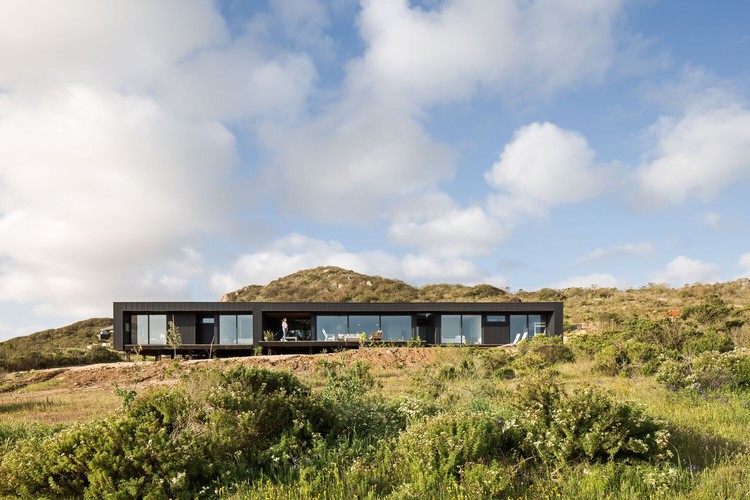
The current demands of the industry lead architects to design based on construction solutions that accelerate processes without compromising quality, while reducing waste and dependence on intensive labor. Among these options, SIP panels stand out as a modular alternative that combines thermal and acoustic insulation with speed and construction precision.
Named after their acronym, SIP panels are self-supporting elements consisting of a rigid foam core sandwiched between two structural claddings, typically OSB boards. Strong yet lightweight, these panels are manufactured under strict factory controls and transported to the construction site, facilitating the rapid assembly of floors, walls, and ceilings, while creating an airtight thermal and acoustic envelope. The thickness of the panel depends on the combined thickness of its components, and its weight typically does not exceed 20 kg per square meter.


Although designers most commonly use SIPs with two claddings and an insulating core—supporting dead loads of up to 5 kg/m2 and live loads of more than 30 kg/m2—there are options that include additional wooden frames to increase rigidity. This high mechanical resistance is achieved by adhering the panel's different components with polyurethane emulsion. In addition, each panel can include cavities for the passage of installations and other ducts. Thanks to prefabrication, it is estimated that the use of SIPs can reduce construction times by more than 50% compared to traditional methods, also eliminating a large amount of waste typical of on-site construction.
However, each project is different, and it is important that the composition and dimensions of the SIPs used are adapted to these particularities, from the requirements of the inhabitants to the climatic conditions they will face. In terms of fire resistance, both the outer coatings and the insulating core must comply with local regulations, incorporating materials and/or additives that delay the generation of flames. Regarding the installation process, the simplest method is to mount the modules on wooden sills, joining the different panels with glued slats of smaller dimensions.

Let's review the successful application of SIPs in real cases of residential architecture.
In the case of the Shotgun House—designed by Alejandro Soffia in Cachagua, Chile—the SIPs embody the architect's intention to adopt a replicable construction system that delivers the benefits of high-quality architecture on a massive scale. According to the architect, "to take advantage of the prefabricated systems, in this case, the bays strictly respond to the multiplication of the module as it comes from the factory. In this way, materials and processes are reduced, resulting in cost and time savings." In width, the house is made up of 33 panels of 4.88 meters, adding up to 40 meters in length and a total area of 426 m2. "The base ‘bay’ optimizes the measurements of the panels, and it’s been modified according to the different programmatic requirements," he adds.





Also in Chile, La Dacha Mountain Hut builds its entire perimeter with SIPs 21 centimeters thick, providing a lightweight solution for remote construction while ensuring optimal thermal insulation. The panels form continuous walls around much of the volume and are clad with burnt pine boards (shou sugi ban) on the outside.


SIPs can also be integrated with other construction solutions. In the El Tume House by abarca+palma, the panels were combined with wood carpentry to construct the foundation pillars, beams, interior and exterior partitions, coatings, and floor. In this case, the SIPs are externally clad with untreated Oregon Pinewood, which will weather to a gray hue over time.



The architects of abarca+palma explored the same mixed solution in the House in Alto Grande, integrating the woodwork and the SIPs to "generate modular coordination between all its construction elements." The panels in this project are covered with zinc plates.



Systematizing the construction process according to the assembly process of the prefabricated materials, the Hats House took 5 months to be built. The SAA architecture + territorio team incorporated SIPs into the envelope of the floors, walls, and ceilings, covering them on their visible side with native wood with a rustic appearance.


For the Origami House, the Mas Fernandez Arquitectos + OR Arquitectos team used SIPs covered with treated pine wood to guarantee adequate thermal insulation for the envelope. This construction system was combined with a metallic structure for the widest spans of the project.

.jpg?1627166472)
Oller Caracas House mixes exposed concrete with walls, partitions, and ceilings made of SIPs, externally clad with tin and internally with wood.


The team of Benjamin Goñi Arquitectos and Claro + Westendarp Arquitectos chose SIPs as the main construction system for two twin houses in southern Chile due to their good thermal insulation. The modular system allowed them to incorporate traditional elements of the area's architecture, and "instead of creating eaves as a roof finish, frames are built around the window openings to keep the rain away from the windows."


In their design for the Lerida House, architects Cristian Yazigi and Crescente Böhme Alemparte used SIPs to expand and renovate a house from 1970. "For the intervention on the first floor, it was chosen to build using the existing materials of the house, including reinforced concrete and masonry walls, while the second level is constructed from SIPs and features a ventilated wooden façade."


Externally wrapped with black quadroline metal panels, Cristián Romero Valente's WV House is composed of a metal structure that forms its walls and ceilings. To provide thermal insulation, an interior skin and SIPs have been added to the exterior, eliminating thermal bridges and incorporating a high-performance heat recovery ventilation system.


Explore additional projects constructed using SIPs here.


